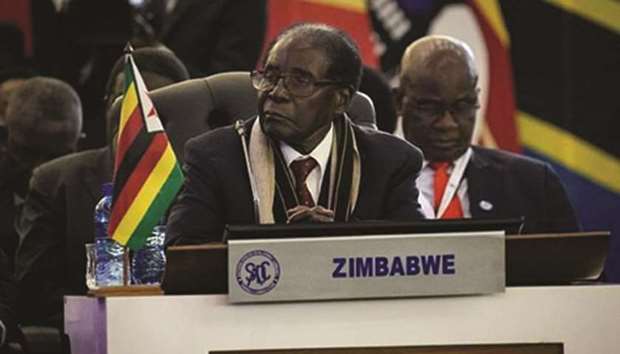President Robert Mugabe has accused a recently launched opposition alliance seeking to unseat him in next year’s elections of plotting with Western powers to force him out.
Morgan Tsvangirai, the leader of the country’s main opposition party the Movement for Democratic Change (MDC), formed a grand coalition last month with former allies and four opposition parties in an effort to end Mugabe’s 37-year rule.
“Recently we have witnessed the concerted effort by opposition political parties to coalesce and fight (us) as one,” Mugabe, 93, said at a meeting of his ZANU-PF party’s central committee in Harare.
“We know of course they are a creature of the West whose sole purpose is to dislodge ZANU-PF from power, but really if they come together as a bundle, one blow will set the bundle in pieces.
“Fortunately for ZANU-PF, the political parties are as divided as ever, fighting over political positions.”
A planned pact between Tsvangirai and Mugabe’s former vice-president Joice Mujuru failed following disagreements over leadership.
Tsvangirai has made three failed attempts for the presidency.
In 2008, he beat Mugabe in the first round of voting but failed to win an outright majority, leading to a run-off.
He later pulled out of the second ballot as violence against his supporters raged.
Past elections in Zimbabwe have been marred by violence, intimidation and charges of electoral fraud.
The president, who often travels abroad for medical treatment, has refused to name a successor and repeatedly denounced factionalism within his own party.
Yesterday Mugabe said that Zimbabwe’s economy, hobbled by foreign currency shortages and a widening budget deficit, was slowly rebounding and would be driven by mining and agriculture.
Without giving details, Mugabe told a meeting of the ruling ZANU-PF’s central committee that the former British colony was on the way to regaining its status as a regional breadbasket and was expecting a bumper harvest of the staple maize in 2017.
Zimbabwe generates half of its export earnings from mining, particularly gold and platinum, but diamond output fell to 961,000 carats last year from 3.5mn the year before, after the government seized all gem mining in the east of the country.
“We are going to leverage on diamonds and other minerals, alongside agriculture, so that together they drive our economic recovery trajectory,” Mugabe said. “Our economy is slowly on the rebound, I am sure you will agree we are improving.”
The International Monetary Fund (IMF) expects Zimbabwe’s economy to grow by 2.8% this year after 0.7% in 2016, thanks to a rebound in agriculture, while the government has forecast a 3.7% expansion.
But on Thursday, business leaders told Mugabe that his government’s expanding fiscal deficit and domestic borrowing were unsustainable and could destabilise the bank sector.
Zimbabweans are unable to withdraw money from banks and spend long hours in queues for as little as $20 while businesses face long delays in paying for imports.
Retailers have warned that the delays could cause shortages of basic goods.
Zimbabwe has not been able to borrow on international financial markets since 1999.
Last month, the central bank ordered platinum and chrome miners, Zimbabwe’s main foreign currency earners, to surrender 80% of their export earnings – up from 50% – to contain the dollar shortage.

President Robert Mugabe
